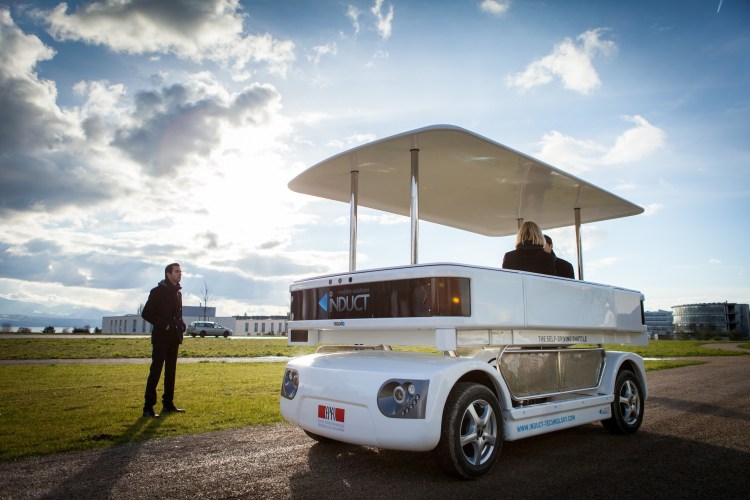French company Induct has launched an electric driverless vehicle for last-mile transit in the United States, and it’s running demonstrations of the gizmo today at the 2014 International CES trade show in Las Vegas.
The demo of Induct’s Navia vehicle at CES — one of the biggest technology events in the world — follows long-term beta deployments at a university in Singapore, a technology institute in Switzerland, and other sites.
On four wheels, Navia can weave around pedestrians as it carries as many as eight people. It relies on four laser-based LIDAR units and two cameras to look out for any objects in its path.
Users can summon the Navia on a mobile device and can then select a destination by pushing a button on Navia’s touch screen. The vehicle maxes out at 12.5 mph. Think of it as a possible extension for buses or trains, to deliver passengers right to their front doors.
Navia’s batteries recharge by way of magnetic induction when the vehicle rolls over a magnetic pad.
The Navia needn’t drive along a rail or other pre-defined path. An operator can define the vehicle’s path, and while it can roll over grass, it was designed to travel on concrete, Induct’s head of marketing, Max Lefèvre, said in an interview with VentureBeat.
A Navia costs $250,000, excluding a 10 percent maintenance fee, Lefèvre said. Beta customers have paid less, although at least one — the École Polytechnique Fédérale de Lausanne in Switzerland — plans to bring on a fleet, Lefèvre said.
The company wants to sell or lease Navias to universities, airports, hospitals, theme parks, concert venues, and other facilities, Lefèvre said.
Meanwhile Google has been developing driverless cars. If Navia sales in the United States could put Induct ahead of the search giant in Google’s home country in the race to commercialize driverless vehicles.
Induct started in 2004. Based in Croissy sur Seine, France, the company announced Navia in 2011 and took on its first venture funding — $1.6 million from Mangrove Capital Partners — that same year.


